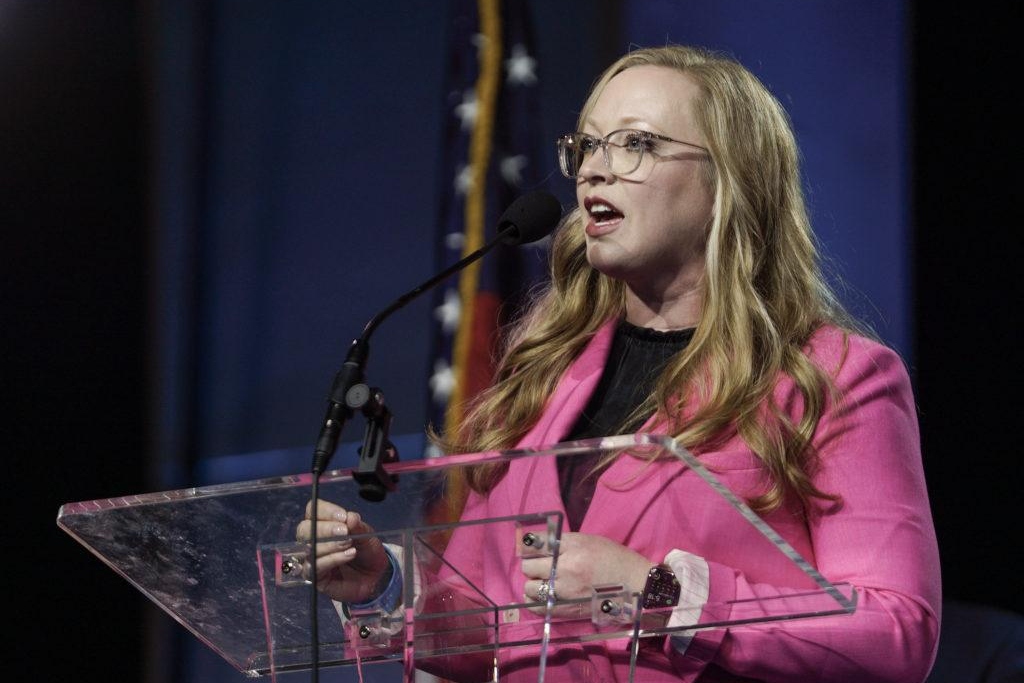
Elizabeth Graham, ERLC vice president of operations and life initiatives, speaks about the potential upcoming shift in the pro-life movement with the possible overturn of Roe v. Wade.
The reversal of the Roe v. Wade decision will be cause for celebration if it occurs, but it will not change the fact that the church must compassionately reach abortion-minded women, Southern Baptist pro-life specialist Elizabeth Graham said June 15 at the Southern Baptist Convention’s (SBC) annual meeting.
The Ethics & Religious Liberty Commission (ERLC) presented “Standing for Life: Equipping the Church for a Post-Roe World” during the afternoon session while Southern Baptists await what they hope will be a Supreme Court opinion overturning the 1973 decision that legalized abortion nationwide.
The high court is expected to issue a ruling by early July regarding a Mississippi ban on abortions of preborn children whose gestational age is more than 15 weeks. A draft opinion leaked in early May appeared to indicate a majority of the court is ready not only to uphold the ban but overrule the Roe v. Wade decision. If that opinion becomes final, abortion policy would return to the states.
“If the Supreme Court overturns [Roe], it will be a historic day for life, and we will celebrate the thousands and thousands of lives that will be saved,” said Graham, the ERLC’s vice president of operations and life initiatives. While the ERLC “will pursue every legal option available to restrict the taking of life, an equally important goal is for abortion also to be unthinkable and unnecessary in the hearts and the minds of our culture,” she told messengers.
“A post-Roe world is good, but a post-abortion world is what we continue to fervently work to achieve by reaching these women where they are in their time of crisis,” Graham said. “The work does not end if [Roe] is overturned. It is the beginning of a new chapter for us. It’s critical that we inspire, disciple, equip and mobilize a new generation to defend the dignity of all human life, transforming our culture so that they see abortion as unnecessary and unthinkable.”
Graham acknowledged some messengers may question the use of the word “unnecessary.”
“When we say we want to make abortion unnecessary in our lifetime, we don’t use that term because we believe it’s necessary,” she explained. “We absolutely believe it is unnecessary. But because so many women believe abortion is their only option, we’re speaking their language to them because they feel scared, oftentimes trapped, shamed and don’t know where to go—which makes these women feel it is the only choice to make.”
The ERLC also uses “unnecessary” to refute “the constant narrative” fed women by Planned Parenthood for 50 years that abortion is necessary for them to flourish and to make a living, Graham said. Planned Parenthood is the country’s No. 1 abortion provider.
“This is what these women have heard, and this is what they feel in their time of desperation,” she told messengers. “We don’t need to be an echo chamber in our own community, using words and language that we approve of and that makes us comfortable. Rather, we must reach these abortion-minded and abortion-vulnerable women where they are and speak with empathy and relevancy to their situation, which is often messy and complex and dire.”
Graham announced the Stand for Life Conference will be held in collaboration with other organizations Jan. 18-19, 2023, in Washington, D.C., on the occasion of the 50th anniversary of the Roe ruling. The event is intended to unify pro-life leaders and organizations, as well as the church, to strengthen the movement for a new generation, she said.
Kevin Smith, teaching pastor of Family Church in West Palm Beach, Fla., and vice chairman of the ERLC’s trustees, encouraged Southern Baptists to engage sinful people like Jesus did in Luke 15:1-2, rather than like the religious leaders.
Christians will be challenged as they encounter women and men who have been influenced by the false message from Planned Parenthood and others that abortion is their only choice, Smith told messengers. “[W]e as the church of the Lord Jesus Christ, and Southern Baptists in particular, have to have a different, peculiar, holy, sanctified, loving witness in our local communities.
“Tone is going to matter, brothers and sisters.”
Smith encouraged Southern Baptists to think about:
- Their rhetoric “as we seek to make our congregations places that the weary and confused might come for refuge.”
- Their engagement with foster care and adoption in the states. “If we are going to create a culture where women in crisis will take a pregnancy to term, we’ve got to create a culture where they know that many Christians desire to adopt. They’ve got to know that children won’t linger in foster care and adoption systems within our states.”
- The reality of methods of abortion that are private. “[W]e have to contend for the minds of abortion-minded women because there are non-public ways to have an abortion,” such as mail-order abortion pills.
- The church’s “on-the-ground, salt-light reputation in our community.”
(EDITOR’S NOTE – Tom Strode is Washington bureau chief for Baptist Press.)

